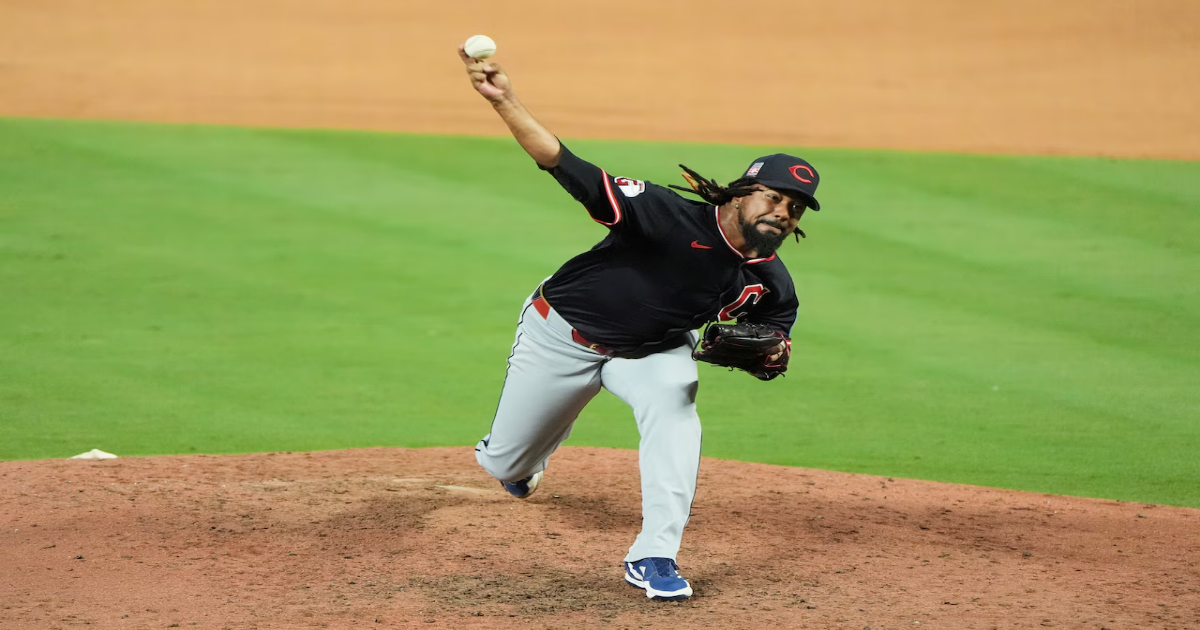CLEVELAND, Ohio — Guardians pitcher Emmanuel Clase is under investigation for sports betting. And in the time it takes you to read that story, another gambling ad (or two) will likely air during a sports broadcast.
According to a 2024 study by the Canadian Broadcasting Corporation, viewers encountered 2.8 “gambling messages” per minute during a series of NBA and NHL games tracked by the CBC. We’re not even counting football or baseball broadcasts, and we lack the data to track podcast commercials.
League sponsorships? Website ads? Brand spokespeople like ESPN personality Pat McAfee (supported by FanDuel)? My head is spinning.
Suffice to say: Any cognizant sports fan has been implored to download DraftKings, try BetMGM, or use the promo code “BET4FREE” at a different gambling shop. Many bet their beer money (and nothing more) without issue. As a result, few see the reality lingering behind one man’s nightmare.
Clase is not the problem here. He’s the symptom of a bigger one.
In the land of legal bets, vice teases our screens like the sun rises. We see it each day; we take it for granted. And while we wince at people who get burned, we blame them.
Should’ve worn more sunblock.
Unlike sunbathers, however, sports gamblers lack the knowledge required to protect themselves. Sure, they know how to dial 1-800-GAMBLER thanks to fine print and speedy, don’t-sue-me ad copy. But they’re only steered to call if they (or a loved one) “has a gambling problem,” which, of course, nobody does.
What even is a “gambling problem?” How do we spot it? How do we guard against it? You don’t know, either?
See, we’re both fine.
On the other hand, casinos are large for a reason. People love money and lack self-control. The lure of winning big is hard to ignore.
We’re human. All of us. Me too.
Last week, I spent five days in Las Vegas for Big Ten Media Days, and I’m no square. Like you and your friends, I played cards. My buddies rolled dice. Together, we bet a few dollars each on a horse named “Princess Poppy,” who promptly won her race and more than tripled our money.
What a thrill. What a city. What a … good thing I only stayed five days. Luck doesn’t last, and blackjack dealers are the last people to tell you when it ends. Linger too long, and you’ll leave with a hole in your wallet.
In the old days, a bad gambler’s story ended there. They visited Vegas, lost too much money and, whoa, crazy weekend.
Oh well, back to real life.
Now the two worlds are intertwined. We can bet on our phones or laptops with promo codes from the television. Our favorite sports personalities, many of whom collect gambling dollars to egg us on, make betting sound fun. The Cavs and Guardians broadcast their games on FanDuel TV.
How bad could betting be?
In responsible hands, fair question. If you have the money to lose, and that’s all your betting, fine. Harmless hobby. But as Clase reminds us, gambling can stir good people to make bad mistakes for silly reasons.
The Guardians pitcher earns almost $5 million dollars per year, and he was — emphasis on “was” — due for a raise this offseason. He didn’t need the money.
His life never lacked stakes, either. He competes against the world’s best hitters daily.
So why’d he do it? Don’t waste your breath. Gambling often defies logic.
In the past two years alone, MLB, the NFL, the NBA and the NHL have all launched investigations into players who bet their sport. Pistons guard Malik Beasley, under NBA investigation as we speak, boasts $59.9 million in career earnings. Lions receiver Jameson Williams was entering year 2 of a four-year, $17.4 million rookie contract when the league suspended him six games for violating its gambling policy. And Guardians pitcher Luis Ortiz (salary: $782,600) was on pace to set a new career high in strikeouts per nine innings before MLB placed him on paid leave earlier this month.
All three players risked their livelihoods over … what, exactly?
You’ll be reminded soon. In the time it took to read this story, another couple gambling ads likely aired during a baseball game, not to mention the countless others funding the media industry (Full disclosure: Cleveland.com has promoted sports betting partnerships in the past).
A 2025 ESPN study revealed that gambling ads are airing less frequently during NBA broadcasts over the last year, but its survey does not count fantasy sports ads. If you do (raises hand), then gambling ads are down one percent, but ad spending is up 15%.
And by the way, we’re still not counting football games, baseball broadcasts or the podcast space.
Ad not displaying properly? Become a Cleveland Baseball Insider by clicking here.
